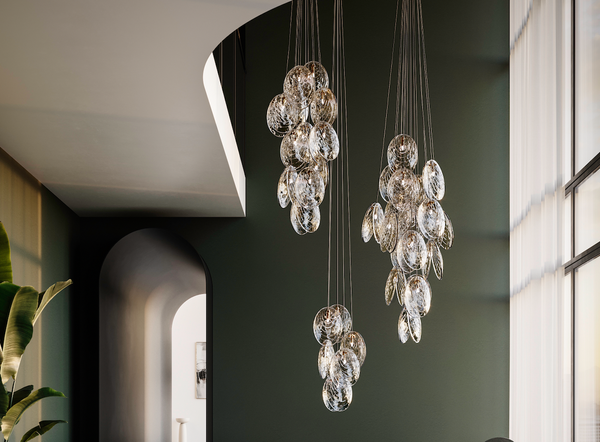The mission of Györgytea is built around the cultivation of natural remedies that are slowly becoming forgotten. The tea business not only seeks to preserve the tradition of folk herbal medicine—it also bears the legacy of a family’s history. György Szabó—also known as ‘Gyuri bácsi’ the equivalent to ‘Uncle Gyuri’, or as ‘the herb man of Bükk’ (a mountain range in Hungary)—has been sharing his advice on how to use nature and ancient folk knowledge to protect our health for almost two decades. According to family legend, the knowledge of medicinal plants has been passed down for five generations, a passion he shared with his children and grandchildren as well. Ever since his daughter, Zsuzsanna Lopes-Szabó entered the business, she’s been the managing director of the company, and as she puts it, she runs the business as the ‘other half of the generation’. Zsuzsanna told us the history of Györgytea, its success, and its foundation—herbs.
The article was published in print in Hype&Hyper issue 4.
You’ve been working together with your father in the family business of herbal medicine for 18 years now, but how did your journey together begin? You started your career with a degree in humanities, what made you decide to continue the family tradition and leave your original plans behind?
Years ago, when I was asked this question, my answer had always been that I didn’t want to get involved, but now my answer would be different. The way things turned out was meant to be.
When my father retired in 1989, he was looking for something to spend his free time with, something that my mother would support as well. He started thinking about his childhood and herbs came into the picture, and from there it was a no-brainer. I was living in Portugal at the time, and I rarely went home, but soon enough I noticed him talking to me about things like ‘company contracts’ and ‘company law’, and I was impressed with how well he was handling these things. Later, when I felt like he could use some help, I moved closer to home, to Switzerland. I tried to help him out wherever I could, although I didn’t feel like I could offer much help, even though I tried my best. As a literature and language teacher, with completely different interests, I had never been interested in business. Still, this is how I got involved in the family business—with no business background whatsoever.

Over the years, you’ve created a new herb garden as well as a new manufacturing plant, and you’ve also received numerous awards and general praise, such as the Design Management Award or the Most Successful Female Entrepreneur 2020. How do you feel in this role now?
That’s a very good question, and surprisingly, I feel good! I enjoyed challenges right from the start. On the one hand, I was driven by curiosity to see what the outcome would be of working with my family, and on the other hand, I felt at ease, knowing that there was no financial stake at play, as Györgytea was founded with zero financial assets, so there was no pressure to make a living out of it, which made the whole process easier for me. Today, I’m amazed at how far we’ve come, and all the things that have happened in the last few years, the company and the number of people working here have gone through a huge growth. I’ve been commuting from Switzerland to Hungary each month for the last eighteen years, and I often ask myself: do I really need this? But if I didn't enjoy it or if I felt it wasn't right for me, I would be doing things differently, so yes, I enjoy my job and the success that comes with it.
You’re not only well-versed on the business side of things, but also in the world of herbal medicine, and you're now a qualified phytotherapist.
Yes, and although at first, I felt like I didn’t need to get involved in the professional side of herbal medicine—as my father deals with this area of the company—I realised that it wouldn’t hurt if I knew a little more about it myself, and I haven’t regretted taking the leap.
I completed my studies at a naturopathic school, and during my first year, our curriculum was the same as what healthcare workers studied. Again, this was outside the scope of my basic interests, but I was still very happy to soak up all the new knowledge we were taught. But what I had to watch out for was that what we were taught in school, was not necessarily in line with the knowledge passed down from my father. I had to make a distinction between the knowledge coming from my family, which was not necessarily false or wrong, but simply not part of our course.



At Györgytea, as well as continuing the family tradition of herbalism, one of the pillars of operation is that you keep all the processes under your control. How are Györgyteas made?
To this day, we still work with wild plants picked in the fields and forests, which means we are totally dependent on nature—and this is one of the reasons why we are determined conservationists. However, we don’t do this work ourselves, we buy the herbs and plants from families in and around the village, and they collect everything from the immediate vicinity of the National Park, from a clean environment. These families have already learned how to harvest ethically (for example, not to tear, but cut the plants to ensure they will grow the next year as well), and to make sure they only pick quality plants, which saves a lot of time and effort. After drying and cutting, we store the plants until the next season.
In one of your books you stated: “if you don’t spend a little time tending to your health every day, one day you’ll have to dedicate a lot of time to your illness” and this really stuck with me. How important are herbal teas for you? Besides your work, how do they play an integral part of your everyday life?
It would be very bad if I didn’t believe in what I do—I drink herbal tea because I believe in it, not because it’s my profession. Each day I have bottles of various blends ready to drink, alternately or simultaneously. Chamomile, for example, which is great for all sorts of inflammations, or our Women’s Teablend with milfoiI—which I drink a mug of every day. We also have a tea for the health of your veins, which stimulates brain function and keeps cholesterol levels in check. Besides tea, I don't drink much water or other liquids.


Why do you think there’s a growing interest in herbs and herbal teas nowadays?
There’s been a global trend when it comes to going natural and using fewer chemicals, such as washing with eco-detergents, avoiding synthetic materials, and cutting back on medications—the goal is to care for ourselves better. People tend to be interested in how their grandmothers lived, and that includes herbs used by almost every family back in the day. Thankfully, there are still many herb specialists alive who are happy to pass on their knowledge to those interested, so everyone can learn the uses and benefits of these plants.
It’s been a year since Uncle Gyuri retired. What would you like to focus on in the family business?
My father is a very charismatic person, and he became a household name even before the company was established: he travelled around the country, gave lectures and advice sometimes to only 2-3 people, but sometimes to hundreds. The press also adored him, and we were constantly being approached by the media because his personality and his activities were interesting, so he is definitely one of the reasons why people got to know our business. Now that he's retired, filling the void he left is a big task.
As Albert Einstein said, “Life is like riding a bicycle. To keep your balance you must keep moving.” In other words, we can’t stop: while staying true to our mission—promoting herbs and herbal teas—we also have to come up with new things. For example, I’d like to expand our range of products, as herbs can be used for many things, not just for herbal teas, but for ointments, soaps and baby baths as well. My goal is for the company to look into new directions.
At one point you mentioned that you feel that when you get interviewed, readers usually can’t get a proper sense of who you are. Beyond herbs, what are some of the issues or topics that you feel are important to advocate for and start discussions about?
I’d answer with a quote from the famous Hungarian writer, Magda Szabó: “The world is so beautiful that it’s an ever-growing responsibility to be human.” You can’t live your life irresponsibly. We’re responsible for each other, and for our planet.


3 FACTS ABOUT HERBS:
1. No herbs are toxic. Plants with strong active ingredients are used by the pharmaceutical industry.
2. Yes, it’s possible to gather dangerous plants, but it’s not worth it. On Györgytea tours you can learn about what plants are safe and what are best to avoid.
3. Fun facts for children: magic wands are made from Elder trees, and fairies live in elderflower bushes. Before cutting the branches, you have to tap them so that the fairies can escape in time.
3 TIPS TO PROTECT YOUR HEALTH:
1. Alternate the types of herbal teas you drink every day.
2. Age-old advice: eating healthy means eating smaller portions and lots of fruit and vegetables.
3. Switch up soft drinks for herbal teas!
Photos: Dániel Gaál

Once upon a time, there was a brotherhood | Russia-Georgia Friendship Monument

Odesa bids to host the 2030 World Expo with spectacular pavilions










